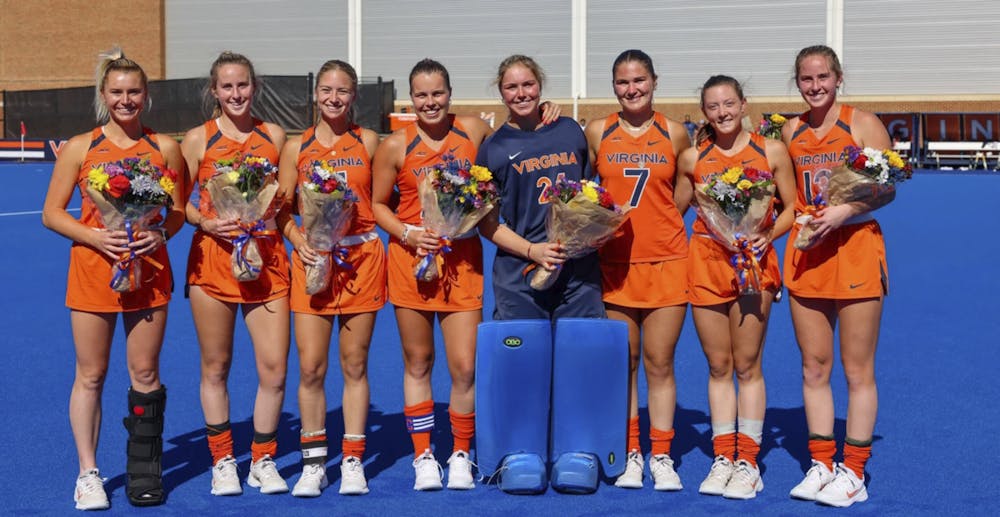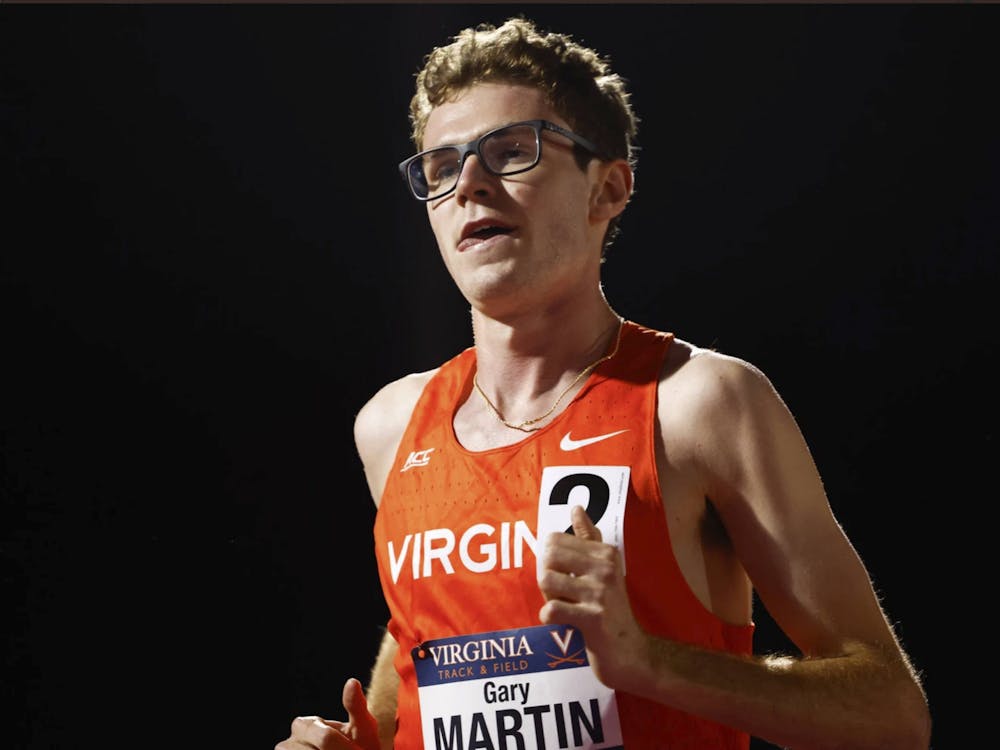By all accounts, Virginia field hockey should have been a contender for a national championship this season — even after losing longtime Coach Michelle Madison, who stepped away in the final weeks of the 2023-24 season.
For the majority of the 2024-25 campaign, the Cavaliers ranked No. 3 in the nation, defeating an impressive total of seven ranked opponents. And after a 2-1 victory over Penn State to kick things off Aug. 31, Virginia went undefeated for nine straight games — the program’s best start to a season since 2010.
That all changed when the Cavaliers fell to Boston College Oct. 4. The loss, which came in overtime, exposed the cracks in what had otherwise been a strong run-up to that point. The Cavaliers continuously wasted prime looks in front of the goal — including a two-player advantage on an attacking penalty corner — and ultimately allowed the Eagles to end the impressive Cavalier winning streak.
This loss highlighted some of the key issues that led to Virginia’s downfall in the postseason. For one, the offense did not show up when it desperately needed to. Newly-appointed Coach Ole Keusgen had previously called the Cavaliers’ offensive performance “not good enough,” and he was right to do so.
On the season, Virginia registered 238 shots on goal but only converted on 43, averaging just 2.26 goals per game. They came in second in the ACC, but were leagues behind conference and national leader North Carolina, which averaged 3.86 goals per game. Considering the sheer number of looks the team had on goal, that goals-per-game mark should have been astronomically higher.
A major reason for these offensive pitfalls was the Cavaliers’ failure to score on attacking penalty corners. Despite tallying 98 penalty corners on the season, Virginia scored only 12 goals off of set pieces. Penalty corners are a golden opportunity to get on the scoreboard, but the Cavaliers found the net a measly 12.2 percent of the time. In turn, that failure diminished their ability to build momentum during games.
Virginia also struggled in the midfield, especially when it came to technical fouls. The Cavaliers racked up a whopping 29 green cards and nine yellow cards on the season compared to just 17 and four for opponents, respectively. As these numbers suggest, Virginia constantly committed needless violations that resulted in opponents gaining ground on offense at the worst possible time. In short, the Cavaliers allowed opponents to benefit from their sloppy gameplay instead of cleaning up their stick work to avoid illegal tackles and physical play.
While the offense and midfield had their struggles, the real culprit in killing Virginia’s postseason chances was the consistently poor defensive performances, specifically in goal. Senior goalkeeper Tyler Kennedy trailed the entire NCAA in save percentage with 0.512 and saves per game with 2.21, compared to 0.719 and 3.77 respectively as ACC averages. Clearly, there was a serious disparity between Virginia and the rest of the conference in defensive performance.
So understandably, when postseason play began, the Cavaliers traded Kennedy’s veteran experience for a new look. Sophomore goalkeeper Nilou Lempers was given the keys to the goalkeeper position, and was an upgrade over Kennedy. Lempers edged out her senior counterpart with a 0.667 save percentage. Lempers appeared for less than half the minutes Kennedy did but still registered 16 saves to Kennedy’s 21, displaying game IQ far beyond her years.
It is hard not to wonder why Lempers was not put in sooner when Kennedy began to falter. In the Cavalier’s loss to Boston College in early October, Kennedy allowed the Eagles to score on all three of their shots. Later that month, she ceded four goals to Saint Joseph’s in the home contest, making only two saves in the entire game.
Conversely, Lempers shined under pressure, especially against ranked opponents. She held a powerhouse Michigan team scoreless for 58 minutes and prevented the Wolverines from finishing a late comeback. In the NCAA quarterfinals against eventual national champion Northwestern, she tied a career-high five saves and commanded a back line that held the best team in the country to just two goals in regulation. It is obvious that Lempers has a bright future ahead of her with Virginia field hockey — maybe if she had played more, that future would have propelled the team further into the postseason.
As Virginia field hockey looks to the 2025-26 campaign, Keusgen should look to strengthen the Cavaliers’ netminder first and foremost. The goalkeeper is the lynchpin of every championship-winning team, and if Virginia wants to earn that coveted title, Keusgen must shore up the defenses that sank this year’s squad.
Even so, there are many positive takeaways from the 2024-25 campaign. For one thing, Virginia’s offense was multifaceted in the number of key contributors, something which suggests the potential for a well-rounded offense. Junior midfielder Daniela Mendez-Trendler led the team with eight goals but was far from the only contributor on the front line. Graduate midfielder Suze Leemans registered seven goals of her own, while sophomore striker Emma Watchilla scored six, and senior back Jans Croon scored four. In addition, senior back Emily Field notched a team-leading 10 assists overall, ending her Virginia athletic career on a high note. Even though Virginia failed in clutch moments, this offense flashed potential.
In addition, the Cavaliers earned a multitude of recognitions on the national stage. Alongside Croon, senior midfielder Noa Boterman was named to the NFHCA Senior Team. Croon was also the ACC Defensive Player of the Year, the program’s first-ever recipient of the award. Leemans and Croon were named to the All-ACC First Team, while graduate midfielder Meghen Hengerer earned All-ACC Second Team honors. It was the first time earning postseason conference honors for all three Cavaliers.
Ultimately, while the season did not live up to last year’s Final Four run, it is important to remember the context of Keusgen’s debut campaign. This past offseason, Virginia lost many of its key veteran contributors on all areas of the field as well as Madison.
What’s more, the Cavaliers only added four new players to the roster. While all four saw playing time this season — Leemans in particular proved an invaluable addition to the midfield — two are still only freshmen and one had not played field hockey since high school. Four new members is too few to spark a championship run in a group still adjusting to new leadership. It is unfair and unrealistic to expect the same level of production from a team so different from previous years.
However disappointing, the 2024-25 campaign should not diminish confidence in Virginia field hockey moving forward. Keusgen has high expectations for such a talented group of players, and with a powerhouse group of recruits headed to Charlottesville next year, it is hard to believe they will not be met. Fans should look to this season as the beginning of the next NCAA field hockey dynasty, not the end of one.







